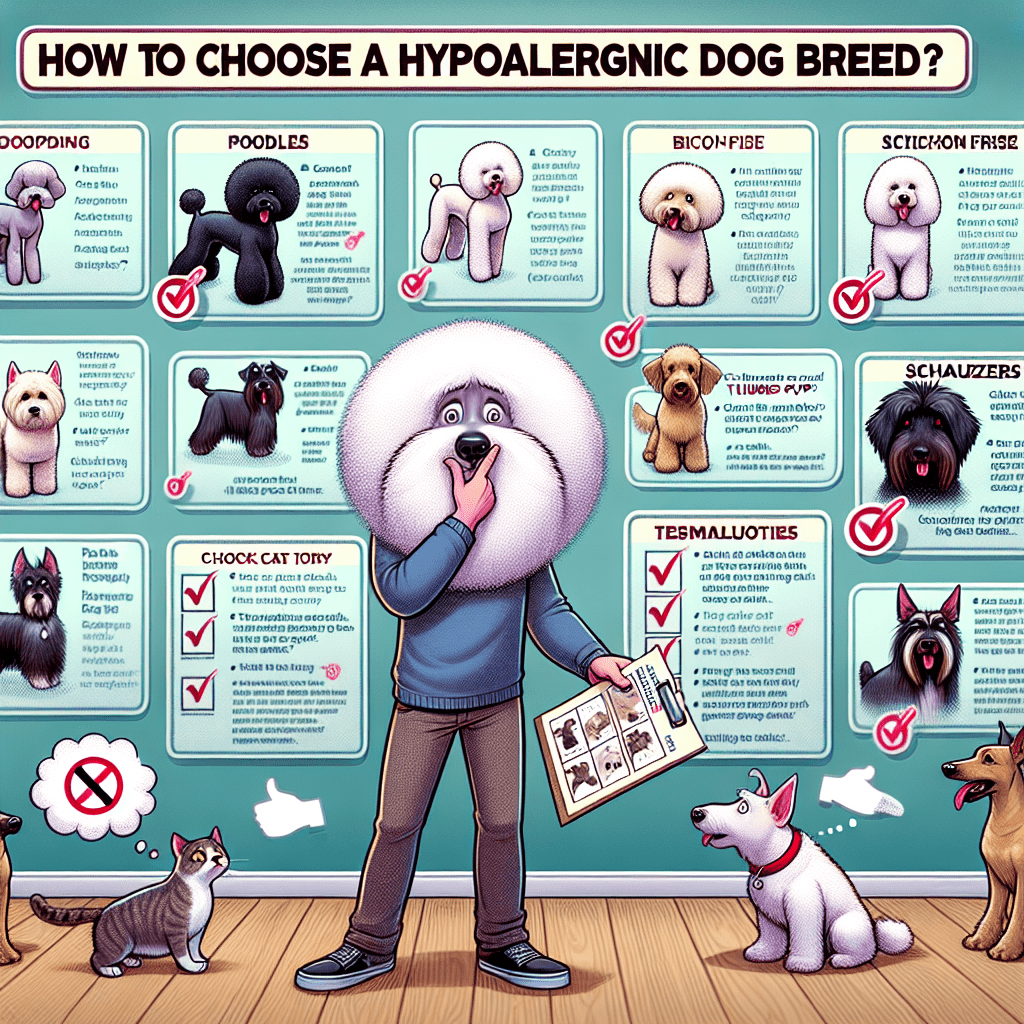Get your free Book Here

Hypoallergenic Dogs 101: Your Ultimate Guide to Choosing the Right Breed
If you’ve ever dreamt of welcoming a furry friend into your home but hesitated due to allergies, you’re not alone! Millions of dog lovers out there yearn for the companionship of a dog without the itchy eyes, sneezing, and respiratory irritation that often accompany pet ownership. Thankfully, hypoallergenic dogs offer a pawesome solution! In this ultimate guide, we’ll explore everything you need to know to find the perfect hypoallergenic breed, from understanding what makes a dog hypoallergenic to discovering the best breeds for allergy sufferers. Let’s embark on this journey towards doggy happiness!
1. What Does Hypoallergenic Mean?
Before we dive into specific breeds, it’s essential to understand what "hypoallergenic" truly means. Generally speaking, hypoallergenic dogs are those breeds that are less likely to trigger allergic reactions in sensitive individuals. Unlike typical dogs, which shed fur and dander, hypoallergenic breeds tend to produce fewer allergens or have hair that is less likely to be released into the environment.
However, it’s important to note that no dog is completely hypoallergenic; what we’re aiming for is a breed that produces fewer allergens. In this chapter, we’ll explore the various allergens associated with dogs, including:
- Dander: The primary culprit for allergies, pet dander consists of tiny skin flakes that can become airborne and land on carpets, upholstery, and clothing.
- Saliva: When dogs groom themselves, their saliva can spread onto their coat, which can become airborne as well.
- Urine: Allergens from urine can also contribute to allergic reactions, although the amount of this allergen is typically less significant than dander or saliva.
Understanding these components is crucial as you search for a breed that might be perfect for you or your loved ones.
2. Finding the Right Hypoallergenic Breed
Now that we’ve established what hypoallergenic means, it’s time to identify which breeds may suit your lifestyle best. Consider the following factors when choosing a hypoallergenic dog:
- Size: How much space do you have at home? Smaller breeds may thrive in apartments or smaller houses, while larger breeds may require a yard to run and play.
- Temperament: Each breed has its own unique personality traits. Some breeds, like Poodles, are intelligent and eager to learn, while others, like Basenjis, tend to be more independent.
- Activity Level: How active are you? If you enjoy outdoor activities and exercise, you might prefer a more energetic breed.
Researching different breeds will help you get a clearer picture of what might fit seamlessly into your life.
3. Popular Hypoallergenic Breeds
Now let’s highlight some of the most beloved hypoallergenic dog breeds. Depending on your lifestyle and preferences, the following breeds might make the perfect addition to your family:
-
Poodle: Available in standard, miniature, and toy sizes, Poodles are not only intelligent and highly trainable, but their curly coat also helps trap dander and allergens. Plus, they have a friendly and playful demeanor that makes them a favorite for families.
-
Bichon Frise: With their fluffy coat and cheerful disposition, Bichon Frises are small, affectionate companions. They have hair rather than fur, which minimizes dander and shedding—making them a popular choice for allergy sufferers.
-
Schnauzer: Ranging from miniature to giant, Schnauzers are known for their distinguished bearded appearance. They are highly loyal and protective, making them great family pets while being hypoallergenic.
-
Portuguese Water Dog: This sporty breed has a wavy coat that doesn’t shed much, which makes it less allergenic. They are energetic and love to be involved in family activities, particularly water sports!
-
Maltese: Known for their long, silky hair that requires regular grooming, Maltese dogs offer companionship with a low allergenic profile. Their affectionate, playful nature makes them great lap dogs.
4. Grooming and Care for Hypoallergenic Breeds
One common misconception about hypoallergenic dogs is that they require less grooming. While it’s true that they may shed less hair, grooming is still a vital part of maintaining their coat and minimizing allergens. Here are some grooming tips to keep in mind:
-
Regular Brushing: Different breeds require different grooming frequencies, but regular brushing helps remove loose hair, dirt, and dander trapped in their coat.
-
Bathing: Regular baths can help reduce dander and allergens, but frequent bathing can strip the natural oils from the dog’s skin, leading to irritation. Consult your veterinarian for the best bathing schedule.
-
Professional Grooming: Some hypoallergenic breeds, like Poodles and Bichon Frises, may benefit from professional grooming, which can ensure their coats remain in top condition.
-
Clean Environment: Keep your home clean by vacuuming regularly and using air purifiers to minimize allergen build-up.
5. Understanding Allergic Reactions
While hypoallergenic dogs are meant to lower the chances of allergic reactions, it’s essential to understand how these reactions work. For anyone susceptible to allergies, the following symptoms may arise, and they can range from mild to severe:
- Sneezing and nasal congestion
- Itchy or watery eyes
- Skin rashes or hives
- Coughing or wheezing
If you’re unsure about how you or your family will react, it’s wise to spend time with a specific breed before making a decision. A visit to a local shelter or breed rescue allows you to interact in controlled environments, which helps you gauge potential allergic reactions without the commitment of adoption right away.
6. Training Your Hypoallergenic Dog
Training is an essential part of pet ownership, and it constitutes a strong bond between you and your furry friend. Hypoallergenic dogs are no different—they thrive in an environment where they feel loved, secure, and mentally stimulated. Here are some training tips to get you started:
-
Positive Reinforcement: Use treats, praise, and affection to reward good behavior. This method is effective and builds trust between you and your dog.
-
Consistency is Key: Establish a routine for commands and training sessions. This will help your dog learn faster and understand expectations.
-
Socialization: Expose your dog to different environments, people, and other pets to help them become well-adjusted adults.
-
Patience and Persistence: Just like humans, learning takes time. Celebrate small milestones and be patient.
7. Common Misconceptions About Hypoallergenic Dogs
As a dog lover, you’ve probably heard a few myths surrounding hypoallergenic breeds. Let’s address some of the most common ones:
-
Hypoallergenic Means No Allergens: While hypoallergenic dogs produce fewer allergens, it’s still possible for people to react to them. Always test potential breeds if allergies are a concern.
-
Smaller Breeds Are Always Hypoallergenic: While many small breeds are hypoallergenic, it’s essential to consider larger breeds like Portuguese Water Dogs or Standard Poodles.
-
Hypoallergenic Dogs Don’t Need Grooming: Grooming is just as vital for hypoallergenic dogs as it is for other breeds. Regular grooming helps manage allergens.
8. Bringing Your Hypoallergenic Dog Home
Congratulations! You’ve found the perfect hypoallergenic breed that suits your lifestyle. Now, let’s prepare your home for your newest family member:
-
Dog-Proof Your Home: Remove any hazards, secure loose wires, and ensure that items they could chew or swallow are out of reach.
-
Create a Cozy Space: Designate a comfy area with a bed and toys. A space makes them feel safe and allows them to unwind.
-
Introduce Family Members: Ensure all family members understand how to interact gently with your new pup. It helps reduce any anxiety for both parties.
-
Schedule Regular Vet Visits: Ensure you maintain your dog’s health with regular check-ups and vaccinations.
Conclusion
Welcoming a hypoallergenic dog into your life can be one of the most fulfilling experiences you’ll ever have. By understanding what hypoallergenic truly means, researching breeds, and preparing your home, you’ll ensure a smooth transition for everyone involved. These wonderful companions can provide love, joy, and countless pawsitive moments for you and your family.
Whether you’re dealing with allergies or simply want to find a breed that suits your lifestyle, hypoallergenic dogs can provide the love and loyalty that all dog lovers desire. To make an educated decision about your new furry friend, take your time, research, and embrace the dog-loving community. You and your hypoallergenic dog will create a lifetime of cherished memories together!
FAQs
1. Are hypoallergenic dogs completely allergen-free?
No, hypoallergenic dogs are not entirely free from allergens, but they produce fewer allergens compared to other breeds.
2. How do I know if a hypoallergenic breed is right for me?
Spend time with the breed to see if you have any allergic reactions. Research their temperament, grooming, and exercise needs to find a good match.
3. How often should I groom my hypoallergenic dog?
Regular grooming is essential. Depending on the breed, you might need to brush them several times a week and schedule professional grooming every couple of months.
4. Can I adopt a hypoallergenic dog from a shelter?
Yes! Many shelters and breed rescues have hypoallergenic dogs looking for loving homes. Check your local shelter for available pets.
5. What should I do if I start experiencing allergic reactions to my hypoallergenic dog?
If you notice symptoms, consult your doctor for advice. Additionally, increasing cleaning practices and grooming schedules may help reduce allergens.
Unlock the Secrets to a Well-Behaved Dog! 🐾 Tired of your pup’s bad habits? Discover how to transform your unruly dog into a loving companion with our FREE Dog Training Mini Course! Learn essential commands, potty training tips, and effective techniques to eliminate unwanted behaviors in just days. Don’t miss out—sign up now and start your journey to a happier, obedient dog! Join Here! (https://bit.ly/3RJak0a)
Instantly Access Your Free Children’s Books Here! (https://payhip.com/BlueCherryStore) – Disclaimer: I may earn a commission from qualifying purchases as an affiliate. Please note that I only recommend products I believe will provide value to my readers.(M)







